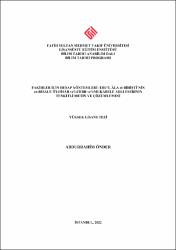Fakihler için Hesap Yöntemleri: Ebu’l Âla El-Bihiştî’nin Er-Risâle Fî’l-Hisâb Ve'l-Cebr Ve'l-Mukâbele Adlı Eserinin Tenkitli Metin ve Çözümlemesi
Citation
ÖNDER, Abdurrahim, Fakihler için Hesap Yöntemleri: Ebu’l Âla El-Bihiştî’nin Er-Risâle Fî’l-Hisâb Ve'l-Cebr Ve'l-Mukâbele Adlı Eserinin Tenkitli Metin ve Çözümlemesi, Fatih Sultan Mehmet Vakıf Üniversitesi Lisansüstü Eğitim Enstitüsü Bilim Tarihi Anabilim Dalı Bilim Tarihi Programı, Yayımlanmamış Yüksek Lisans Tezi, İstanbul 2022.Abstract
Bu çalışmanın konusu Risâle fi’l-Hisâb ve’l-Cebr ve’l-Mukâbele adlı
matematik eserinin, müellif nüshasına en yakın halini elde ederek Arapça
imla kurallarıyla ifade etmek ve eseri Türkçeye çevirip üzerinde
matematiksel bir değerlendirme yapmaktır. Hicri 8. yüzyılda (Miladi 14.
yüzyıl) yaşamış Ebu'l-Alâ Bihiştî el-İsferâyinî'ye ait olan risale, çeşitli
kütüphanelerde birçok nüshası olmasına rağmen bugüne dek literatüre
kazandırılmamıştır. “Mâ lâ budde lil-fakîh min al-hisâb” adıyla da bilinen
eser, iki makaleden oluşan bir hesâb kitabıdır. Eserin, fakihler için yazılmış
bir hesap kitabı olması matematik kültürü açısından dikkat çekici bir
özelliktir. Müellifin, cebir kitaplarının içeriğinde karşılaşılan kök alma,
yüksek dereceden denklemler, altı denklem formundan mukterenât kısmı ve
geometrik çözümlemeler gibi unsurlara söz konusu eser çerçevesinde
değinmediği belirlenmiştir. Buradan hareketle eserin, fakihlerin
karşılaştıkları cebir problemlerini basit bir şekilde çözmelerini sağlayan bir
rehber kitap olarak, alandaki temel bir ihtiyacı karşılamaya yönelik
tasarlandığı sonucuna varılmıştır. Bu yazım tarzının İslam matematik
bilimleri tarihinde başlı başına bir alt tür olarak sınıflandırılabileceği
düşünülmektedir. The subject of this study is to obtain the closest version of the mathematical
work named al-Risālah fī al-Hisāb wa-al-Jabr wa-al-Muqābalah to the version
written by the author along with expressing it with today's Arabic orthography rules,
and to translate the text into Turkish by making a mathematical evaluation about its
content. This book, which belongs to Abū al-‘Alā’ Muḥammad al-Bihishtī al-
Isfarā’aynī, who lived in the 8th century Hijri (14th century AD), is about calculation
(hesâb) consisting of two articles and has not yet been brought to the literature,
although there are copies of it in various libraries. It is also known as “Mā lā budda
lil-faqīh min al-ḥisāb”. The fact that the work was a calculation (hesab) book written
for the Islamic jurists is crucial in terms of mathematics culture. In the work, it has
been seen that the author did not include the mathematical elements such as square
rooting, higher degree equations, mixed equations (the mukterenat) part of the six
equation forms, and geometric solutions that are generally encountered in the content
of algebra books. From this point of view, it was concluded that the work was
designed as a guide book that enables jurists to solve the algebra problems simply
they encounter, with an aim to meet a basic need in the field. This writing manner
can be thought as a revealing of a new and independent genre in the history of
Islamic mathematical sciences.



















